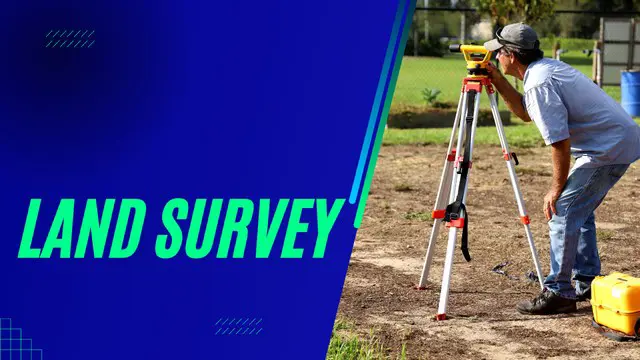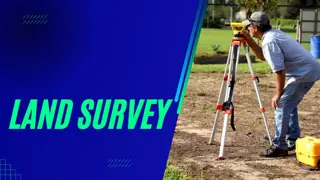
Land Surveying Level 3 Advanced Diploma
CPD Certified| Free PDF Certificate | Lifetime Access | Learner Support | No Hidden Fees | 100% Success Rate
EDURISE
Summary
- Certificate of completion - Free
- Reed courses certificate of completion - Free
- Tutor is available to students
Add to basket or enquire
Overview
Unlock the Secrets of Land Surveying: Your Gateway to Precision and Accuracy
Land surveying is the backbone of countless industries, from construction and real estate to infrastructure development. Whether you're stepping into the world of civil engineering, urban planning, or land management, mastering the art of land surveying can pave the way for a thriving career and a valuable skill set. Our comprehensive Land Survey Training course equips you with the knowledge and expertise needed to succeed in this in-demand field.
Why Land Surveying Matters:
- Precision: Accurate land surveys are crucial for determining property boundaries, preventing disputes, and ensuring proper land use.
- Infrastructure Development: Surveying is integral to building roads, bridges, utilities, and other essential public works.
- Real Estate: Property developers and real estate professionals rely on surveys to make informed decisions about land parcels.
- Safety: Proper surveys help engineers and planners design safe structures and environments.
- Career Opportunities: The demand for skilled land surveyors is growing, offering excellent job prospects.
What You'll Learn:
Module 1: Foundations of Land Surveying
- Understand the historical significance of land surveying.
- Discover the key principles and techniques employed by land surveyors.
Module 2: Types of Surveys
- Explore various types of surveys, from boundary surveys to topographic surveys.
- Learn when and why each type of survey is crucial.
Module 3: Survey Equipment and Technology
- Familiarize yourself with the tools and technology used in modern land surveying.
- Gain insights into GPS, GIS, and remote sensing applications.
Module 4: Legal Aspects of Land Surveying
- Dive into the legal frameworks that govern land surveying.
- Learn about property rights, deeds, and land use regulations.
Module 5: Field Surveying Techniques
- Discover the practical methods used in the field, from measuring distances to creating precise maps.
- Understand how to handle various terrains and challenges.
Module 6: Data Analysis and Mapping
- Learn how to process survey data and create detailed maps.
- Explore software and techniques for data analysis.
Who Should Enroll:
- Aspiring Surveyors: Kickstart your career in land surveying with a strong foundation.
- Engineers and Architects: Enhance your skills and understand the surveying aspects of your projects.
- Land Developers and Planners: Gain the expertise to make informed land-use decisions.
- Real Estate Professionals: Improve your property assessment and transaction processes.
- Students and Enthusiasts: Explore a potential career path or expand your knowledge.
Unlock the door to a world of precision, accuracy, and endless career opportunities. Enroll in our Land Survey Training course and become a skilled professional in a field where expertise is in high demand. Your journey to mastering the art of land surveying begins now.
Free Gift
- Course Completion PDF Certificate
- Tutor Support
Curriculum
Course media
Description
Learning Outcomes:
Module 1 - Introduction of Land Surveying:
- Gain an understanding of the fundamental principles and significance of land surveying.
- Recognize the historical context and development of land surveying as a discipline.
- Identify the essential tools and equipment used in land surveying practices.
Module 2 - Survey Control:
- Learn how survey control points are established and maintained.
- Understand the role of survey control in ensuring the accuracy and reliability of land surveys.
- Explore different types of survey control networks and their applications.
Module 3 - Introduction to Levelling:
- Acquire a foundational knowledge of leveling techniques in land surveying.
- Discover the principles of differential leveling and how it's used to measure height differences.
- Gain an understanding of key leveling instruments.
Module 4 - Level Set-Out & Errors in Levelling:
- Learn how to set out leveling equipment and conduct accurate level surveys.
- Identify common errors in leveling and strategies to minimize or correct them.
- Explore techniques for precise elevation determination.
Module 5 - Traditional Distance Measurement:
- Understand the traditional methods for measuring distances in land surveying.
- Explore the use of chains, tapes, and other analog tools for distance measurement.
- Learn about the limitations and sources of error in traditional distance measurement.
Module 6 - Electronic Distance Measurement:
- Discover modern electronic distance measurement (EDM) techniques and equipment.
- Gain insights into the principles of EDM, including the use of electromagnetic waves.
- Understand the advantages and limitations of EDM compared to traditional methods.
Module 7 - Setting Out During Construction:
- Learn the importance of accurate setting out in construction projects.
- Acquire the skills and knowledge needed to set out reference points and features on construction sites.
- Understand the role of land surveyors in ensuring construction projects adhere to design specifications.
Module 8 - Detail Surveys:
- Explore the concept of detail surveys and their role in collecting data on specific features.
- Learn how to plan and conduct detail surveys for various purposes, such as urban planning or infrastructure development.
- Understand the significance of precision and attention to detail in detail surveys.
These learning outcomes will equip you with essential knowledge and skills in land surveying, from the foundational principles to practical applications in construction and detailed feature surveys.
Certificate of Completion
After completing the Land Survey diploma course, you will be able to obtain your free PDF certificate of course completion.
Who is this course for?
Ideal Audience:
Civil Engineering Students: This course is suitable for civil engineering students who want to complement their theoretical knowledge with practical skills in land surveying. It provides a foundational understanding of the subject that can be beneficial for future engineering and construction projects.
Land Development Enthusiasts: Individuals interested in land development, urban planning, or real estate may find this course valuable. It equips them with knowledge about land surveying techniques and principles, aiding in property development and investment decisions.
Construction Industry Professionals: Professionals working in the construction industry, such as site managers, project engineers, or architects, can benefit from this course. It helps them understand the basics of land surveying and its applications in construction projects.
Geography and Geology Students: Geography and geology students looking to expand their knowledge and skill set in geospatial sciences may find this course relevant. It introduces key concepts used in geographical and geological studies.
Property Owners and Buyers: Individuals who own or plan to purchase land or property can benefit from understanding surveying principles. This knowledge can help them assess property boundaries, topography, and potential land uses.
Entrepreneurs and Land Investors: Entrepreneurs involved in land-related businesses or land investors seeking to make informed decisions can gain insights into land surveying practices. This knowledge can be essential for land investment strategies.
Government Employees: Government employees working in urban planning, public works, or environmental agencies may find value in this course. It can enhance their understanding of land surveying for infrastructure and city planning.
Environmental Conservationists: Those interested in environmental conservation and land preservation may find this course helpful in understanding how land surveying contributes to environmental protection and management.
Curious Learners: Anyone with a general interest in land surveying and a desire to learn about this field without the intention of pursuing it professionally can benefit from this course. It offers a broad overview of the subject.
This course provides foundational knowledge in land surveying, making it accessible to a wide range of learners interested in various aspects of land use, construction, and geography.
Requirements
The Land Survey course has no formal entry requirements.
Career path
- Land Surveying Technician: Entry-level position with a typical UK salary ranging from £20,000 to £30,000 per year.
- Land Surveyor or Surveying Manager: With experience and qualifications, salary can advance to between £31,000 and £50,000 annually.
- Senior Land Surveyor or Director of Surveying: Experienced professionals in these roles may earn £51,000 to £80,000 or more.
Questions and answers
Currently there are no Q&As for this course. Be the first to ask a question.
Certificates
Certificate of completion
Digital certificate - Included
Reed courses certificate of completion
Digital certificate - Included
Will be downloadable when all lectures have been completed
Reviews
Legal information
This course is advertised on reed.co.uk by the Course Provider, whose terms and conditions apply. Purchases are made directly from the Course Provider, and as such, content and materials are supplied by the Course Provider directly. Reed is acting as agent and not reseller in relation to this course. Reed's only responsibility is to facilitate your payment for the course. It is your responsibility to review and agree to the Course Provider's terms and conditions and satisfy yourself as to the suitability of the course you intend to purchase. Reed will not have any responsibility for the content of the course and/or associated materials.


